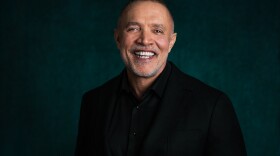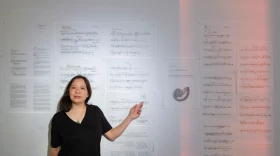-
On the next Modern Notebook with Tyler Kline: Memories of friendship linger beneath each short movement in Hugi Gudmundsson’s Coniunctio — moments on park benches, in bars, on quiet walks. Composed for cello, the piece unfolds in brief, focused chapters that reflect intimacy through gesture, space, and shared experience.Then: Luciano Berio once described a utopian dream: to build a bridge between folk traditions and modern music-making. In Folk Songs, that vision takes shape through melodies from eight cultures — reimagined not as museum pieces, but as living, breathing connections to everyday life.
-
On the next Modern Notebook with Tyler Kline: Rhythmic collisions, layered textures, and long melodic arcs — Autumn Equinox channels the energy of Sebastian Fagerlund’s opera-in-progress into a charged and expressive octet. Though written as a standalone piece, the music carries the imprint of that larger work: a reflection of seasons changing, and ideas taking new shape.Then: Kevin Puts began his Concerto for Orchestra with a single spark — Amanda Gorman’s poem Hymn for the Hurting, written in response to the tragedy in Uvalde. What follows is a sweeping, multi-movement work of contrasts: chase scenes and music boxes, lyrical interludes and urgent refrains, all voiced by an orchestra pushed to its expressive limits.
-
On the next Modern Notebook with Tyler Kline: Reena Esmail’s Saans began as a gift — a piano trio woven from the slow movement of her clarinet concerto, reimagined for a dear friend’s wedding. But over time, it became something more personal, tying together friendship, love, and the quiet breath of life that music can carry across time and distance.Then: There’s a particular kind of memory that holds fast — not the dramatic, but the quietly beautiful. In Sunday, Shelley Washington writes from the memory of one perfect, unremarkable afternoon: reading, wandering, doing nothing. It’s a bittersweet portrait of stillness, written just before everything changed.
-
On the next Modern Notebook with Tyler Kline: From the spiny lobster’s tango-like hunt to the lullaby of eelgrass nurseries, Jenni Brandon’s Sea Songs: California Coast dives into the vibrant ecosystems off the California coast. Inspired by her scuba adventures, each movement brings marine life to the surface — with clarinet and piano painting a world full of movement, mystery, and life beneath the waves.Then: Like a flower that only blooms in darkness, Cereus unfolds gradually — shaped by memory, silence, and resistance. In this piece dedicated to her late father, composer Kay Rhie balances intricate musical detail with a sense of quiet inevitability, letting gestures blossom and fade in a language both personal and luminous.
-
On the next Modern Notebook with Tyler Kline: What begins as a lullaby becomes something deeper. In her piece Out Came the Sun, Shuying Li reflects on the overwhelming joy of new motherhood — and the unexpected grief that followed. Through music, she traces the arc from bliss to sadness to peace, honoring the complex emotional landscape of early parenthood.Then: Inspired by the life of British suffragette Julia Varley, Mercury Songs weaves together archival fragments, folk tradition, and bold storytelling. Composers Emily Levy and Matthew Bourne craft music that gives space to women’s voices — past and present — and honors a legacy of protest, power, and perseverance.
-
On the next Modern Notebook with Tyler Kline: Out of conversations and community, a phrase stayed with composer Nicky Sohn: “a fresh breath of hope.” Written for violinist Mary Grace Johnson and inspired by the stories of women rebuilding their lives, this piece becomes a gesture of resilience — breathing color into darkness.Then: In the journals of Canadian painter Emily Carr, composer Tawnie Olson found something familiar: the highs, lows, and quiet intensity of the creative process. Beloved of the Sky sets Carr’s words to music — a choral portrait of solitude, beauty, and the persistence of making art in a world that doesn’t always understand it.
-
On the next Modern Notebook with Tyler Kline: What happens when our obsession with spectacle turns dangerous? Michael Abels’s Nope Suite, drawn from his score written for Jordan Peele’s genre-blending film, rides the line between sci-fi, horror, Western, and family drama — with a score that gallops, pursues, and holds space for both awe and fear.Then: Waves crash, skies open — and the piano becomes a landscape. In Pacific Triptych, Peter Scott Lewis captures the drama and majesty of the Pacific Coast across three movements, with a sense of scale that feels orchestral, even in its quietest moments.
-
On the next Modern Notebook with Tyler Kline: Conrad Tao’s Undone reimagines the myth of Undine — a water spirit who longs for a soul, only to be betrayed and dissolve back into the sea. But in Tao’s telling, she returns not as a victim, but a force — newly powerful, her waves rising higher in a world reshaped by climate change.Then: Written during the pandemic, Chan Ka Nin’s Harp Concerto is a tribute to his mother — a woman losing her memories, but not her strength. Through shimmering harp lines and a quiet inner song, the piece traces her resilience, her love, and the life she continues to carry inside.
-
On the next Modern Notebook with Tyler Kline: Marie A. Douglas’s Tray is both symphonic and cinematic — weaving shifting time signatures, Dorian-mode melodies, and spirituals in clashing tonal centers. It traces the story of Trayvon Martin, from the night of his death through the aftermath of the trial, and honors lives lost to violence rooted in racial injustice.Then: Inspired by the poetry of Emily Dickinson, Anna Murray’s My Little Force Explodes unfolds in fleeting gestures — breath, whisper, and the interplay of voice and flute. It’s music that also draws from Japanese Noh to shape a sound ritual where silence carries as much weight as sound.
-
On the next Modern Notebook with Tyler Kline: In Listen to the Earth, James Grant takes us aboard Apollo 11 — from liftoff, through orbit, all the way to the lunar surface. Drawing from NASA transcripts, environmental texts, and his own poetic reflections, Grant’s music becomes a call to witness our planet’s beauty from space — and to care for it with everything we’ve got.Then: Inspired by a Mark Rothko painting, Anna Clyne’s Color Field imagines sound as color and color as sound — with musical movements tied to yellow, red, and orange. Each section draws from synesthesia and Scriabin’s color-pitch associations, blending warmth, fire, and calm into a vivid, sonic canvas.
-
On the next Modern Notebook with Tyler Kline: With the earth as muse, Colin Jacobsen offers a musical tribute to Ruth Crawford Seeger in his piece A Short While to Be Here… — imagining the voice she might have found had she lived longer. Weaving together folk memories, modernist language, and the fleeting beauty of life on this fragile planet, his piece pulses with reverence for all who come and go.Then: Liza Lim’s cello concerto, A Sutured World, took shape through months of frustration and discovery — an act of sewing together broken fragments to reveal something whole and luminous. Like golden joins in shattered pottery, her music traces the line between damage and healing.
-
On the next Modern Notebook with Tyler Kline: Satoshi Yagisawa’s Clarinet Concerto doesn’t just spotlight the soloist — it weaves them into a vibrant sound world of contrast and color. Intimate, expressive, and thrillingly fast, it’s a standout in today’s wind repertoire.Then: What if a fugue could swing with jazz harmony? Or a Medieval chant twist in on itself through microtonal layers? In Contrapuntal Forms, Juri Seo turns centuries of technique into a living, breathing, and beautifully unruly sonic ecosystem.
Play Live Radio
Next Up:
0:00
0:00
Available On Air Stations












